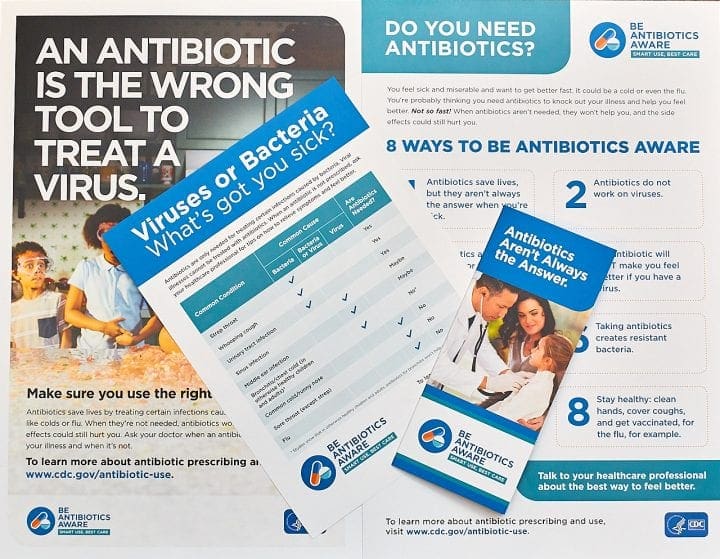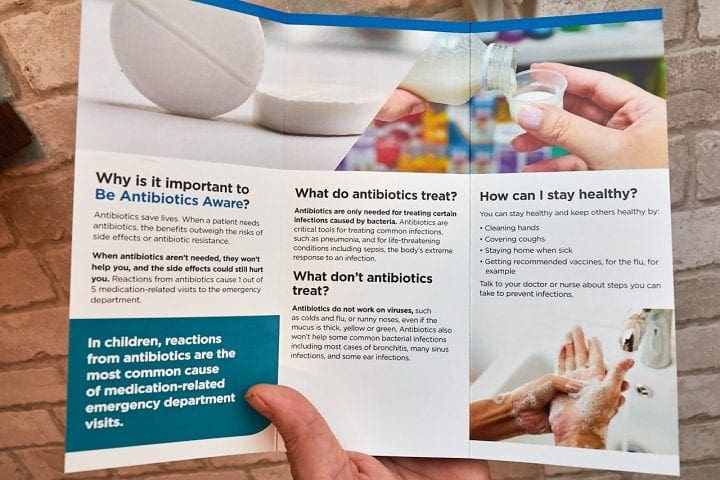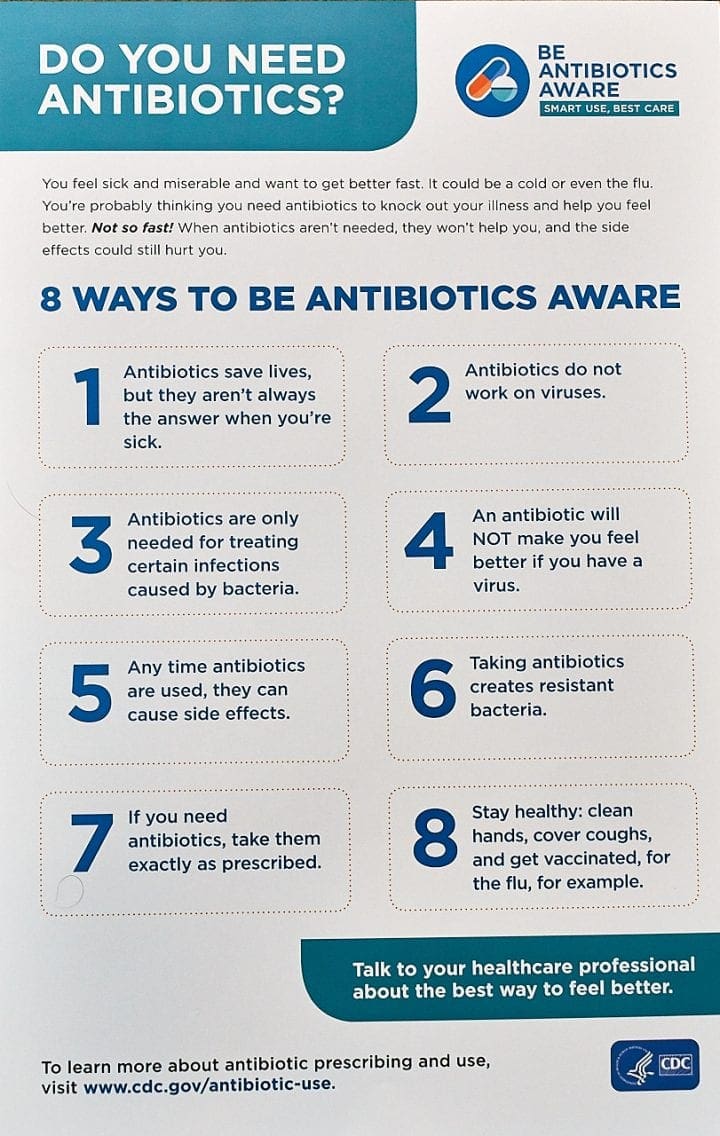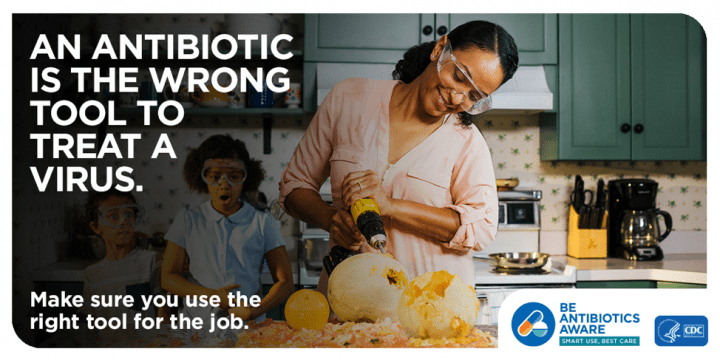Best CBD For Kids
Best CBD For Kids Cannabidiol (CBD) is a chemical compound found naturally in cannabis and hemp plants. Cannabis and hemp plants both contain cannabinoids, a dense substance that has a drug-like effect on the...
Illness. Every parent in the world has been there: awakened in the dark of night by one very sick kid. This was my life maybe two months ago. My youngest came into my room at around 2 in the morning, burning with fever and miserable. Now, my typical move at this point is to offer compassion, a little children's ibuprofen, and a big glass of water…which is exactly what I did when my daughter awakened me that early morning. The next day brought more of the same, and when by day 3 she was still miserable and fevered, we headed to the doctor’s office. We hope that this Be Antibiotics Aware post inspires you.

I can distinctly remember talking with our pediatrician on that morning, discussing what medications my daughter should be taking. I had asked if she should be taking a round of antibiotics, and our doctor explained to me exactly why that was a bad idea. It turned out that my daughter had a bad case of the flu, which is caused by a virus. The doctor explained to me that antibiotics wouldn't help; they are only effective against bacterial infections, not viruses. I ended up learning a lot that day at the doctor’s office, both about how to care for my very uncomfortable 10-year-old and about antibiotics in general.

I remember asking our pediatrician why she wouldn't prescribe an antibiotic just to be “safe.” What would be the harm? As it turns out, quite a bit. See, antibiotics don't work on the viruses that cause colds and the flu, bronchitis, or runny noses, even if the mucus is thick, yellow, or green. Antibiotics are only needed for treating certain infections caused by bacteria, but even some bacterial infections get better without antibiotics. Antibiotics also aren’t needed for some common bacterial infections, including many sinus infections and some ear infections. When antibiotics aren’t needed they won’t help you, and the side effects could still hurt you. Side effects range from minor to very severe health problems, such as a rash or Clostridioides difficile infection (also C. difficile or C. diff). When you need antibiotics for an infection, the benefits of the drug usually outweigh the risk of side effects.

Antibiotic resistance is one of the most urgent threats to the public’s health. Antibiotic resistance does not mean the body is becoming resistant to antibiotics; it means that bacteria develop the ability to defeat the antibiotics designed to kill them. Each year in the United States, at least 2 million people get infected with antibiotic-resistant bacteria. At least 23,000 people die as a result. That's a big deal, and frankly a little scary.
When the bacteria become resistant, antibiotics cannot fight them, and the bacteria multiply.
So what can we, as patients, do to help combat antibiotic resistance?

U.S. Antibiotic Awareness Week (USAAW) is an annual observance held from November 18th to 24th each year. Its goal is to raise awareness about the importance of appropriate antibiotic use and the threat of antibiotic resistance. This is a critical issue because when antibiotics are misused or overused, it can lead to bacteria developing resistance to them, making them ineffective and potentially causing more serious health problems.
While U.S. Antibiotic Awareness Week takes place in November, it's important to remember the importance of using antibiotics responsibly all year round. Here are some things you can do:
By using antibiotics responsibly and being aware of the threat of antibiotic resistance, we can help protect ourselves and future generations from the dangers of ineffective medications.
Five Steps to Take if You Think a Medicine Has Had Terrible Side Effects for You or a Family Member
Antibiotics are critical tools for treating people with serious and life-threatening conditions like pneumonia and sepsis, the body's extreme response to an infection. Improving the way we take antibiotics helps keep us healthy now, helps fight antibiotic resistance, and ensures that life-saving antibiotics will be available for future generations. We hope that you find this Be Antibiotic Aware post valuable. Good luck!
Website | Facebook | Instagram | Twitter | Pinterest | Google+
To learn more about antibiotic prescribing and use, visit www.cdc.gov/antibiotic-use.
To learn more about sepsis, a life-threatening condition that is treated with antibiotics, visit www.cdc.gov/sepsis.
This is a post prepared under a contract funded by the Centers for Disease Control and Prevention (CDC) and written on behalf of the Mom It Forward Influencer Network for use in CDC’s Be Antibiotics Aware educational effort. Opinions on this blog are my own and do not necessarily reflect the views of CDC.
What a great infographic. I was just talking to my brother about antibiotics. Thank you for sharing the facts.
This is very important because people have this mentality wherein they take meds as soon as they see symptoms come up. It’s not always the case and it’s definitely important that we take antibiotics with precaution.
Antibiotics should be taken only with the prescribed dosage. We must also follow and complete the treatment by taking the prescribed antibiotic for the required number of days. Some people stop at mid-treatment when they feel relief. That is only going to make things worse because the bacteria can mutate and become resistant.
This info is so important!! I know people who take antibiotics everytime they feel sick, claiming that’s the only thing that’ll make them feel better. But they should be used only when prescribed and not on colds or viruses. Thanks for sharing, we should spread the word and educate everyone about this.
Thank you for raising awareness for antibiotics use. Some people think this is some kind of a miracle drug. People must be educated on the proper use of antibiotics or else we will be looking at nastier, drug resistant bacteria in the future!
This sounds like some great information about antibiotics. It is definitely important to take antibiotics as prescribed, rather than taking less (or more for that matter).
I’m definitely going to keep this in mind. Antibiotics are so important for certain infections and they have to be used responsibly.
Pretty eye opening to know what antibiotics can and can’t do. Good info here to stay healthy!
This is all helpful information. When I hear of someone taking an antibiotic for a virus I do tell them that it’s just for bacterial infections but they don’t seem to believe me. I need to pass this info along.
It’s kinda crazy how quickly people will just take whatever medication is suggested. It’s so good to be aware, and to only take things when they’re really needed!
Thank you for sharing this! I am pretty lucky to have doctors that don’t prescribe antibiotics at the drop of a hat. The few times I have been on them it has been because I truly needed them. They wreck my body!
This is some really great awareness. Antibiotics can be of major help in certain instances but it’s important to remember they don’t work on everything and to take the regimen as prescribed for sure.
Thanks for sharing this important information. Antibiotics have personally saved my family from serious illness but it’s so important to be informed about these prescriptions.
This is helpful information. I didn’t know antibiotics could be harmful, this is good to know.
I’m not a huge fan of antibiotics. This was very helpful! I try not to really take them
Whoa, super good info! It’s always important to know the pro’s and con’s with any medicine you are taking or thinking about taking.